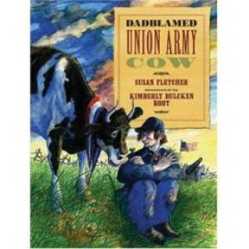Civil War cow immortalized

The Putnam County Library has a children's book that tells the story of a cow that traveled throughout most of the civil war with some Greencastle soldiers.
Children's Librarian Suzanne Hall contacted the BannerGraphic when she received the book and saw the story.
"I just think it is so neat. It's a great book and is good for kids to explain things about the civil war," stated Hall.
The story of the cow ran in an early edition of the Greencastle Banner in 1872. The title of the article was "The Grant and Sherman Cow of Three years' Army Experience."
The article begins explaining that G.W. Lee, superintendent of the Greencastle Public Schools in 1872, found himself to be in possession of a famous civil war cow. The animal was taken near the battlefield of Corinth, Miss. in the spring of 1862 by the Fifty-Ninth Regiment, Indiana Volunteers.
The cow traveled more than 12,000 miles with the Fifty-Ninth and witnessed more than a hundred engagements and skirmishes.
She was also in the Vicksburg and Atlanta campaigns, marched with Sherman's army to the sea and through the Carolinas and Virginia with the Union army. Her job was to furnish the men with milk. And, she was honored for saving many lives.
She was kept at brigade headquarters until she and her brigade were honorably discharged at Louisville, Ky., in July 1865.
A fictionalized version of the story of the cow can be found in a children's book at PCPL called "Dadblamed Union Army Cow" by Susan Fletcher. The back of the book tells the true story of the cow.
Fletcher explains she heard the story on a visit to a school in Washington.
The school librarian told her about a cow that marched in the civil war with the Fifty-Ninth Regiment of Indiana Volunteers, giving milk to the soldiers.
The cow even passed in review with the army in Washington.
It turns out the librarian's ancestor was Jesse Lee, the captain of the cow's regiment. And at the end of the war, after living with Greencastle's school superintendent, the cow went to live on a farm owned by Jesse's brother, George, a professor at DePauw University.
Fletcher saw photographs and newspaper articles that back up the tale. She also shared letters from Jesse's daughter, in which Fletcher learned that the cow saved the soldiers' lives.
Often the supply train couldn't keep up with them, and they were forced to live on not-quite-enough hard tack and wormy bacon. At the end of the war, Jesse, who was six foot two inches tall, weighed only 110 pounds.
Fletcher was born in Pasadena, Calif., and currently lives in Oregon with her husband who is a marketing consultant. The book is available at the Putnam County Library. To see pictures of the cow and Jesse Lee go to www.sus anfletcher.com.
